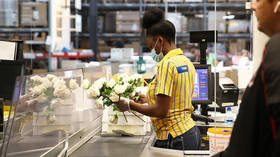Major retailer imposes ‘purchase limits’ on toilet paper

Major Australian supermarket chain Coles has introduced a “fair” purchasing quota per shopper in order to tackle a wave of panic buying amid a rise in Covid-19 cases and supply chain problems.
The retailer announced “national purchase limits” of one pack of toilet paper and two packs of pain relief medicines such as paracetamol, ibuprofen, and aspirin per customer.
The change was made to “maintain availability and make it fair for everyone,” Coles tweeted on Tuesday. The company urged customers to “continue to treat our team with kindness and respect, and only purchase what you need.”
The news came after Australians began clearing shelves in multiple supermarkets and pharmacies amid the rise in Covid-19 cases in major cities Sydney and Melbourne.
Professor Michael Kidd, Australia’s deputy chief medical officer, advised people on Sunday to stock up on painkillers, as many would likely test positive for the virus in the “coming days.”
“It’s important to be prepared because you won’t be able to go to your supermarket or pharmacy if you are diagnosed with Covid-19,” Kidd said.
Waves of panic buying first hit different countries in the spring of 2020, when the pandemic began. Australian media reported that shoppers had trouble finding products like meat and flour before Christmas. The current situation has been exacerbated by staff shortages in retailers like Coles and Woolworths and supply chain disruptions.
Woolworths CEO and Managing Director Brad Banducci told ABC on Monday that up to 40% of employees were not showing up for work at the chain’s distribution centers.
“The absenteeism is a direct and indirect consequence of Omicron,” he said, referring to the strain of the coronavirus behind the surge in cases.













